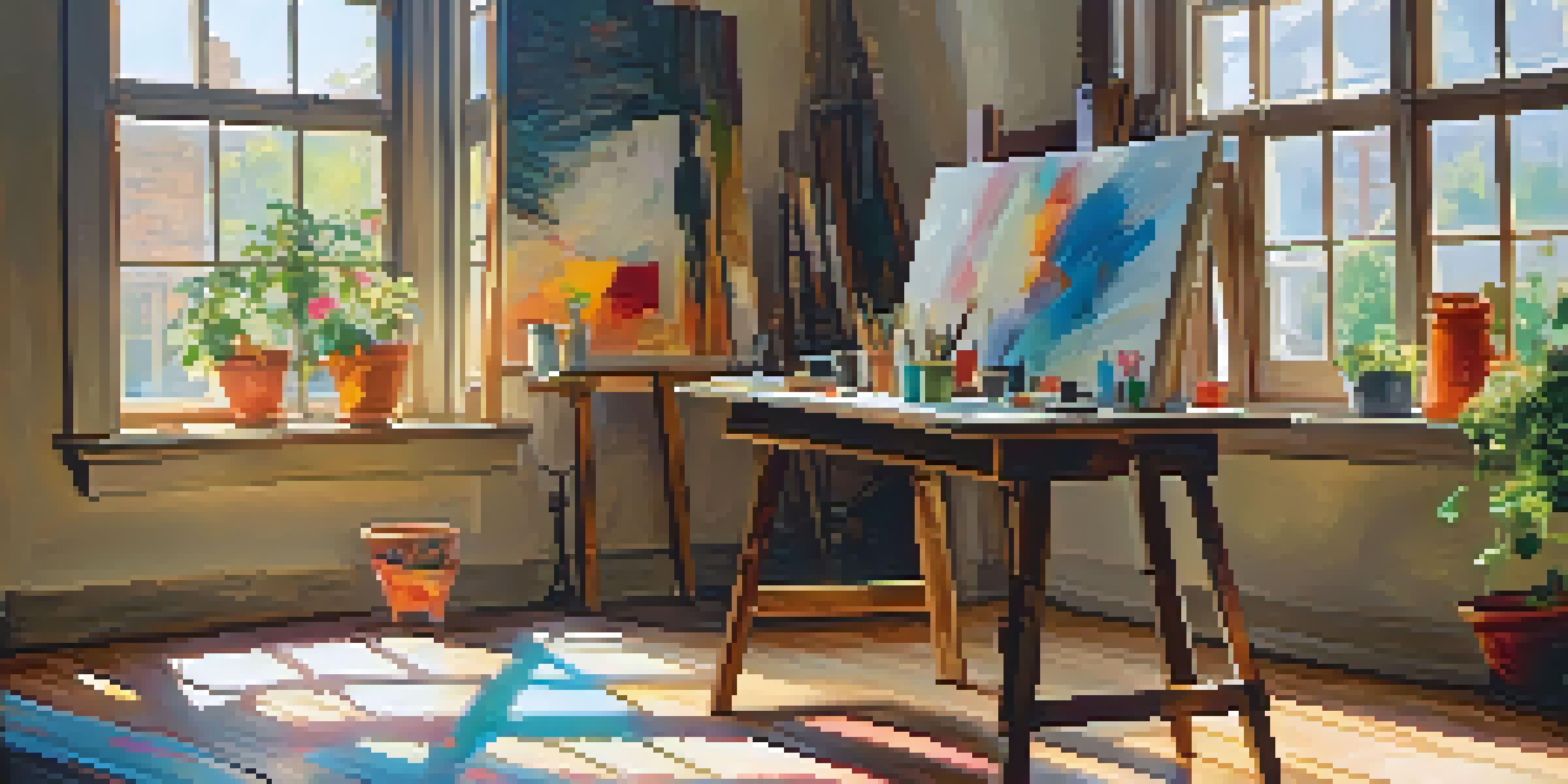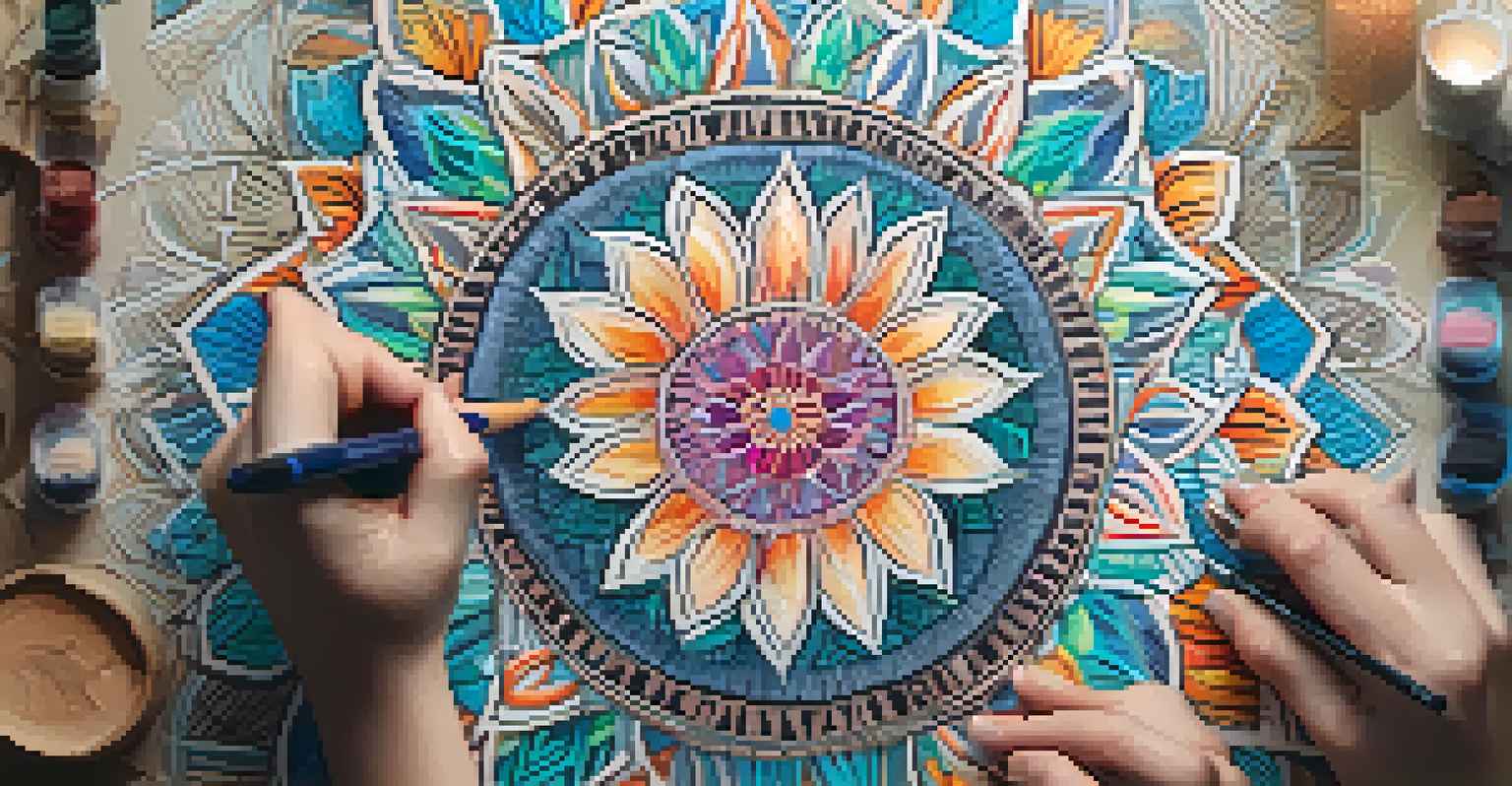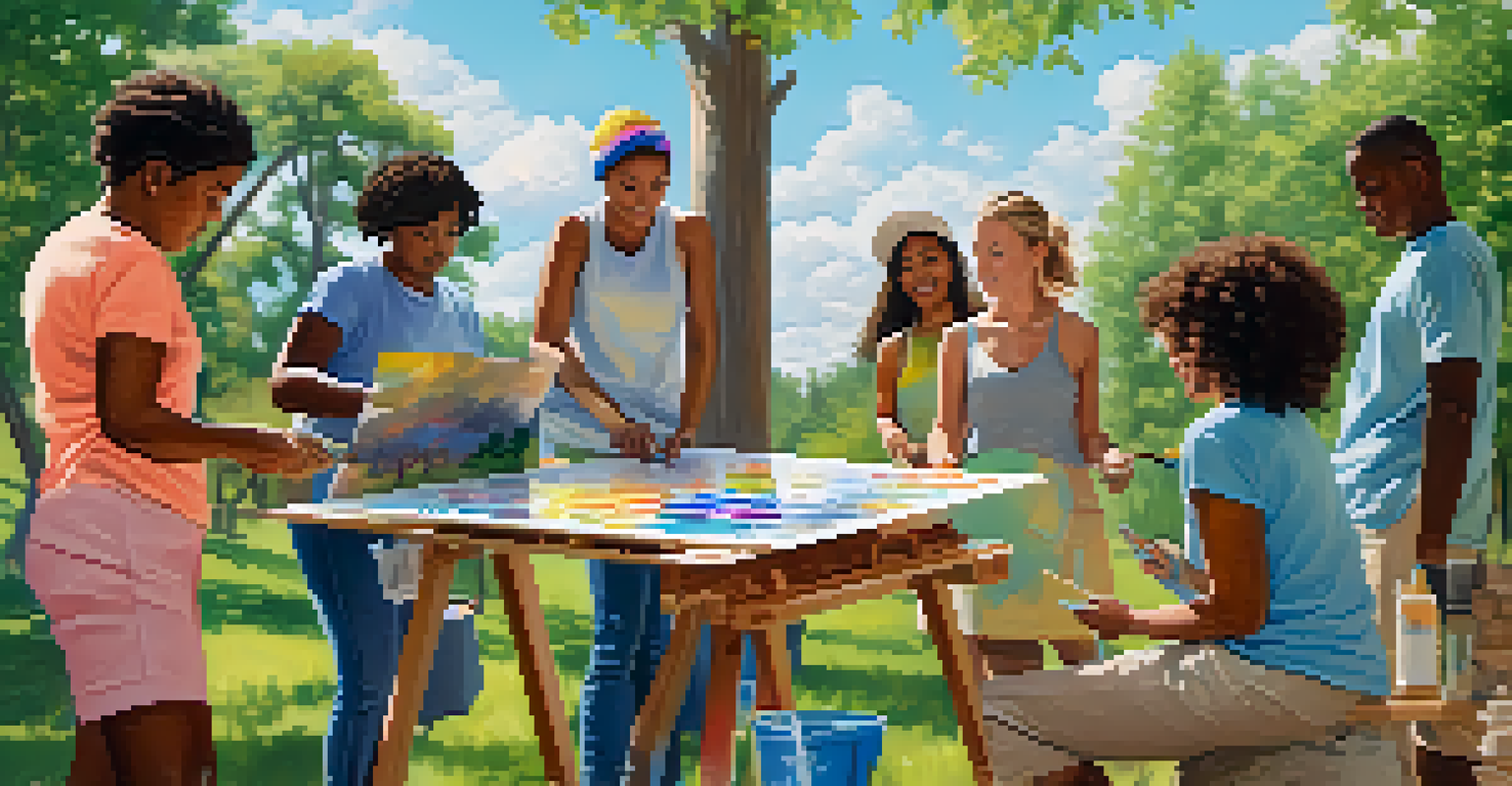Art as a Medium for Spiritual Expression and Healing

Understanding the Connection Between Art and Spirituality
Art has long been a medium through which individuals express their inner thoughts and feelings. This connection to spirituality allows artists to explore themes of existence, purpose, and the divine. Many find that creating art can facilitate a dialogue between the self and a greater universal presence.
Art enables us to find ourselves and lose ourselves at the same time.
For instance, a painter might channel their emotions into a canvas, using colors and strokes to reflect their spiritual journey. This process not only brings clarity but also fosters a sense of connection to something larger than themselves. It's this intimate relationship between the artist and their work that often leads to profound spiritual insights.
Moreover, art transcends language barriers, enabling people from diverse backgrounds to share their spiritual experiences. Whether through painting, sculpture, or music, art becomes a universal language that speaks to the soul, creating a shared space for understanding and healing.
The Healing Power of Creative Expression
Engaging in creative activities can be an incredibly healing experience. Many therapeutic practices incorporate art as a means to process emotions, confront trauma, and foster personal growth. When individuals express themselves artistically, it can lead to a release of pent-up feelings, helping them to heal from past wounds.

For example, art therapy sessions often encourage participants to create without judgment or constraints. This freedom allows for genuine expression, which can be especially beneficial for those who struggle to articulate their feelings verbally. Through the simple act of creation, participants may discover new perspectives on their challenges.
Art Connects Us to Spirituality
Art serves as a bridge for individuals to explore and express their spiritual journeys, fostering a dialogue between the self and the divine.
Additionally, the act of creating can be meditative. It provides a way to enter a flow state, where worries and distractions fade away, allowing for deep introspection. This meditative quality of art-making nurtures emotional resilience and can lead to significant healing over time.
Art as a Reflection of Spiritual Journeys
Many artists use their work to document their spiritual journeys, creating pieces that reflect personal growth and transformation. These artworks often serve as visual narratives of their experiences, struggles, and revelations along the way. Through this reflective process, artists not only document their paths but also invite others to witness their vulnerabilities.
Every artist dips his brush in his own soul, and paints his own nature into his pictures.
Take, for instance, the impactful storytelling found in a powerful mural or a poignant sculpture. These pieces often encapsulate the artist's spiritual evolution, allowing viewers to connect with the emotions and experiences portrayed. This connection can inspire others to embark on their own healing journeys.
In this way, art becomes a shared experience that transcends individuality. It fosters a sense of community as people resonate with one another's stories, reinforcing the idea that we are all interconnected in our spiritual quests.
Cultural Significance of Art in Spiritual Practices
Across cultures, art plays a vital role in spiritual rituals and practices. From indigenous ceremonies to religious iconography, artistic expression is woven into the fabric of spiritual life. This cultural significance highlights the ways in which art can facilitate connection with the sacred.
For example, consider the intricate designs of mandalas used in meditation practices. These artworks serve as visual aids, helping individuals focus and center their thoughts. The creation of such art is often seen as a spiritual practice in itself, fostering mindfulness and a deeper connection to the universe.
Creative Expression Heals
Engaging in artistic activities can facilitate emotional healing and personal growth, allowing individuals to confront trauma and find new perspectives.
Moreover, art brings communities together in shared spiritual experiences. Participating in a communal art project can strengthen bonds and foster collective healing, emphasizing the importance of collaboration in spiritual expression.
Art as a Tool for Mindfulness and Presence
Creating art encourages mindfulness, allowing individuals to immerse themselves in the present moment. Engaging in artistic practices can be a form of meditation, where the act of creation serves as a pathway to focus the mind and quiet the noise of everyday life. This presence can lead to greater awareness of one's thoughts and feelings, ultimately fostering spiritual growth.
As artists become absorbed in their work, they often experience a sense of flow that enhances their connection to both the creative process and their inner selves. This deep engagement can reveal insights about their spiritual journey that they may not have previously recognized.
Additionally, the act of observing art can also promote mindfulness. Viewing art invites contemplation and reflection, allowing individuals to connect with the emotions and stories behind each piece. This experience can be profoundly grounding, encouraging a deeper exploration of one's spiritual beliefs.
The Role of Community in Artistic Spiritual Expression
Artistic expression often thrives in community settings, where individuals can share their experiences and support one another. This communal aspect can amplify the healing power of art, as participants engage in collective creation and reflection. When people come together to create, they cultivate an environment that nurtures spiritual growth and healing.
For instance, workshops focused on art and spirituality foster connections among participants, allowing them to share their journeys and insights. This communal sharing can create a sense of belonging, reminding individuals that they are not alone in their struggles.
Community Strengthens Artistic Bonds
Collaborative art projects and communal experiences enhance spiritual expression, creating a sense of belonging and interconnectedness in healing journeys.
Additionally, collaborative art projects can lead to powerful outcomes, as diverse perspectives come together to create something beautiful. These shared experiences highlight the interconnectedness of our spiritual journeys and can inspire profound healing within the community.
Finding Personal Spiritual Truth Through Art
Ultimately, art serves as a powerful medium for individuals to explore and express their personal spiritual truths. Each creative endeavor can become a reflection of one's beliefs, experiences, and aspirations, allowing for deep self-discovery. This process can guide individuals toward a better understanding of their spiritual identity.
For instance, someone might find solace in writing poetry that articulates their struggles with faith or existential questions. Through the written word, they can confront and make sense of their inner turmoil, leading to a clearer sense of purpose.

Moreover, the act of sharing this art with others can further solidify one's spiritual insights. By inviting others to engage with their creations, individuals foster dialogue and connection, creating a ripple effect of healing and understanding within themselves and their communities.